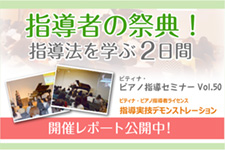PTNA Piano Teachers' Seminar Vol.50 - 1st Part
2017/05/24 | コメント(0)
| トラックバック(0)
|
 PTNA Piano Teachers' Seminar Vol.50 and PTNA Piano Teachers' License Demonstration Session were held On April 22nd -23rd in Tokyo, having 30 lecturers and 600 audiences.
PTNA Piano Teachers' Seminar Vol.50 and PTNA Piano Teachers' License Demonstration Session were held On April 22nd -23rd in Tokyo, having 30 lecturers and 600 audiences.The 1st part was lectures by renowned piano teachers.
Kyoko Maruyama (a member of STEP Repertoires Selection Committee) introduced her recent published book. She has been researching on piano study materials across the world, and all of her efforts and achievements over 30 years were written in this book. She categorized and explained those materials in regards of types, areas of study, and effective ways of learning, in order to encourage piano teachers to consider how they could evaluate and use them in their lessons.
Kyoko Maruyama (a member of STEP Repertoires Selection Committee) introduced her recent published book. She has been researching on piano study materials across the world, and all of her efforts and achievements over 30 years were written in this book. She categorized and explained those materials in regards of types, areas of study, and effective ways of learning, in order to encourage piano teachers to consider how they could evaluate and use them in their lessons.
Miki Narai (the representative of Troika-Tachikawa Station, a member of PTNA Organization Committee, Advisor Selection Committee) talked about Russian pianism, which he studied in Moscow for 3 years. He discussed how to make sonority on piano from two perspectives; the mechanics of the instrument, and the sensibility to the connection of sounds and colors like mystic chords in Scriabin's pieces. He then compared two scores, the original one in which Scriabin wrote agogik and dynamics, and one which is published nowadays, and explained how to find the Russian ways of playing on scores.
Miki Shigeno (the representative of Hiroshima-Macaron Station) talked about the effective communication with students and their parents, based on her own experiences. She pointed out that the most important thing is to be compassionate to one another. "I would like to be a teacher like the sun, not the cold wind", said Shigeno.
Yoriko Oshiro (Executive Director of Jaques-Dalcroze Society of Japan) featured the importance of Rythmique. She performed improvisations on piano, and made the audience feel the various rhythms including the Greek rhythms such as Anapest or Dactyl. In the end, the whole audience experienced the nuances and colors of harmonies by singing together with piano.
Naomi Ishii (the representative of Kobe Central Station, a member of the PTNA Teaching Skill Development Committee) introduced the way of making beautiful sounds, based on the method taught by Prof. Hans Leygraf. She demonstrated various touches on piano, using her arms and fingers effectively. According to her, the fastest progress can be achieved by developing one's ear to be able to distinguish the growing sounds.
Kunio & Keiko Sasaki (the representative of Funabashi-KSM Station, members of PTNA Teaching Skill Development Committee) featured Czerny's 30 Etudes by using an arranged score for duo. This score keeps the original solo piece as the primo part, and adds the accompaniment as the second part. According to Sasaki, there are advantages to play duo than playing etudes alone. When harmonies are added, one may grow the imagination of the music more, and also consider the sonority more carefully. And if a teacher plays with students, s/he may also drive them forward by singing or conducting by one hand.
The reports of the 2nd and 3rd part will be followed.
【GoogleAdsense】